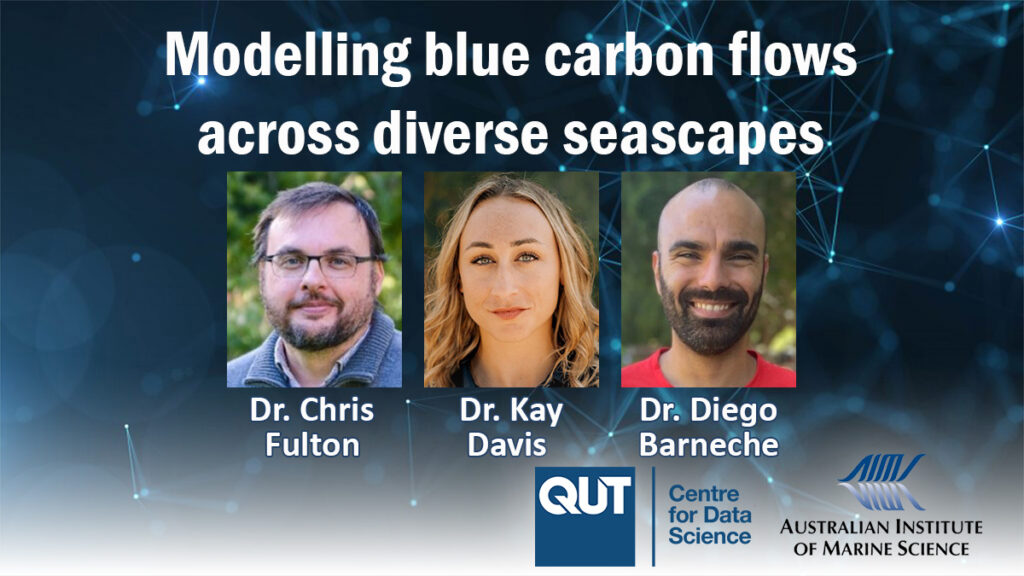
The QUT Centre for Data Science invites you to join us for a Distinguished Visitors’ Lecture. We are honoured to host three excellent researchers from the Australian Institute of Marine Science (AIMS) in Perth.
Title: Modelling blue carbon flows across diverse seascapes
When: Tuesday, 12 November, 3:30 pm – 4:30 pm
Where: GP Z-413 or zoom online: https://qut.zoom.us/j/9372740143?pwd=QeIFiauS6aCap2WUOGhVjqhYbDrwfI.1&omn=87325906806
- snacks and networking will follow the seminar from 4:30 to 5 pm
The blue carbon concept was first coined in 2009 as a policy focus for nature-based solutions to the threat of climate change. Since then, a rapid acceleration in research effort, new policies, and financial investment has flowed into the study and restoration of blue carbon wetlands, which as currently defined, include tidal marshes, mangrove forests and seagrass beds. Much of this focus has been on the rate that foundational plants fix atmospheric carbon and bury it in the soil beneath them. This is known as the autochthonous pathway for blue carbon sequestration. However, within connected seascapes there is a second major pathway – allochthonous carbon – that occurs when lateral flows of biomass from a range of different plants and algal sources travel across the seascape and become deposited into the same area of soil. It has been challenging to unravel the latter pathway for a given soil sample, which can be a mixture organic carbon from over a dozen plant or algal sources. Estimates of the probable contributions of these different sources have typically been calculated using groups of chemical tracers examined with a range of statistical techniques. This presentation will showcase our findings from a systematic review and meta-analysis of the biases arising from these different approaches, some recommended solutions, and how the Blue Carbon Seascapes project is bridging the empirical data gap on measured rates of blue carbon sequestration in diverse tropical seascapes.
Our Guest Speakers:
Dr. Chris Fulton is a marine biologist with 23 years of experience conducting applied research to achieve environmental, social and policy gains through close partnerships with Traditional Owners, community groups, industry and government. Chris completed a PhD in coral reef ecology at James Cook University in 2005, and following a post-doc on the macroalgal community dynamics of tropical reefs (2005-2006), he joined the science faculty at the Australian National University (2006-2020). In 2021 Chris was drawn to the mission of the Australian Institute of Marine Science in Perth, where he leads a diverse team of 27 scientists who bring together expertise in biology, chemistry and ecology with spatial modelling and data science to solve the challenge of maintaining resilient marine ecosystems and sustainable blue economies in a zero-emissions future.
Dr. Kay Davis is a marine biogeochemist at the Australian Institute of Marine Science, specializing in investigating nutrient and carbon pathways at the intersection of biological, chemical, and environmental drivers. While her expertise lies in ecosystem-scale empirical field research, her last few years have also been focused on producing meta-analyses to scale local observations to global trends. Kay obtained her PhD in Chemical Oceanography & Ecology from the National Marine Science Centre in Coffs Harbour, which was followed by a Post-Doc at the Leibniz Centre for Tropical Marine Research in Bremen, Germany. Currently, Kay leads the Soil Carbon Profiling module of the Blue Carbon Seascapes project, exploring carbon sources and burial rates in both recognized and potentially novel blue carbon ecosystems.
Dr. Diego Barneche is an ecologist who is passionate about integrating quantitative tools with experimental and field approaches to unify ecology across scales. He is passionate about using theory-driven reproducible (and open) science to better inform decision-making processes, and ecosystem management in an ever-changing world. After finishing his PhD in theoretical ecology at Macquarie University (2016), Diego had post-doc appointments with Monash University (2015–2017), University of Sydney (2018), and a Lectureship at the University of Exeter (2019). Since 2020, Diego has been working as a quantitative ecologist for the Australian Institute of Marine Science (AIMS) in Perth. His current research spans many topics including (but not limited to) modelling coral reef energy and nutrient cycling and using Bayesian statistics to inform monitoring partnerships with Indigenous Peoples of Australia.
Details:
| Location: | GP Z-413 or Zoom Online |
| Start Date: | 12/11/2024 [add to calendar] |
| Start Time: | 3:30 pm |
| Organiser: | QUT Centre for Data Science |